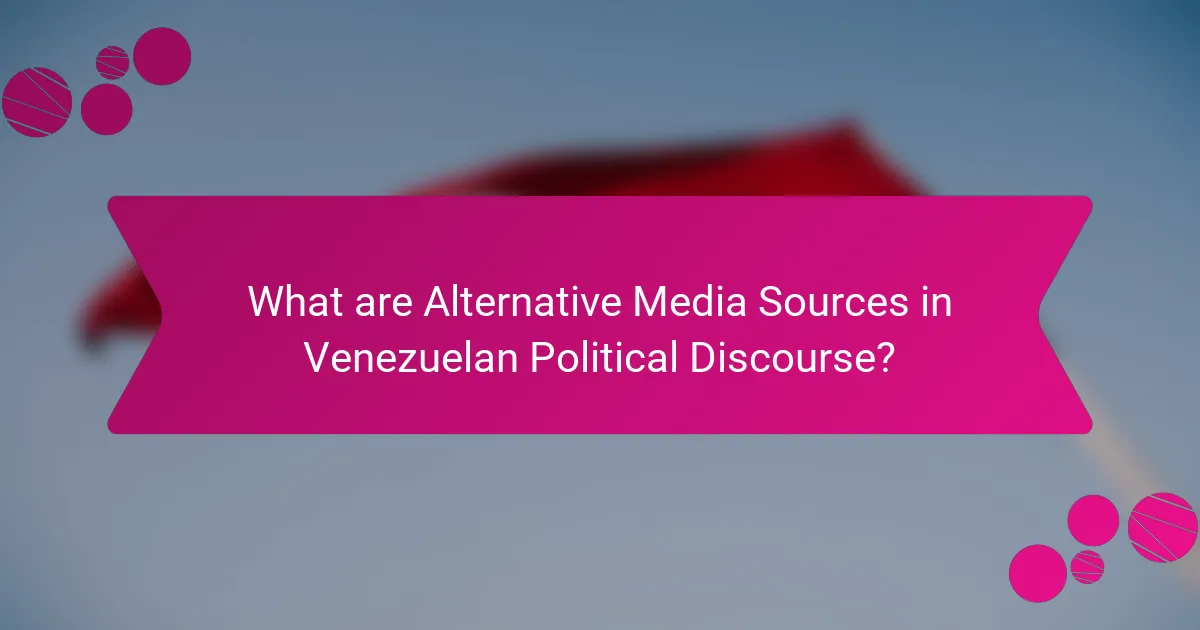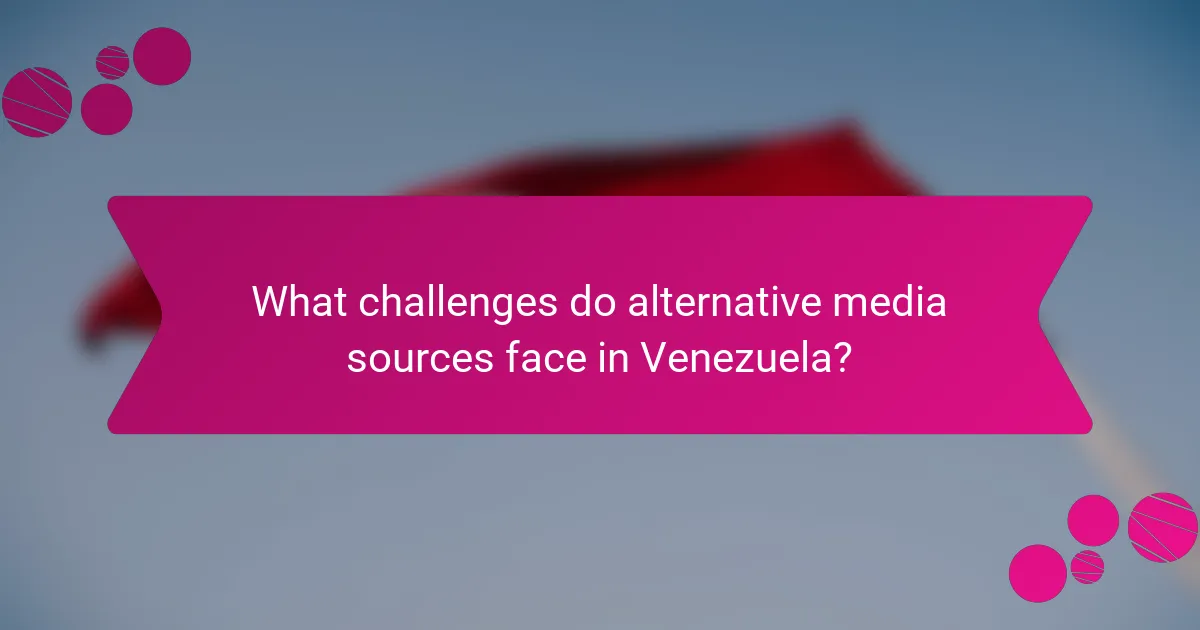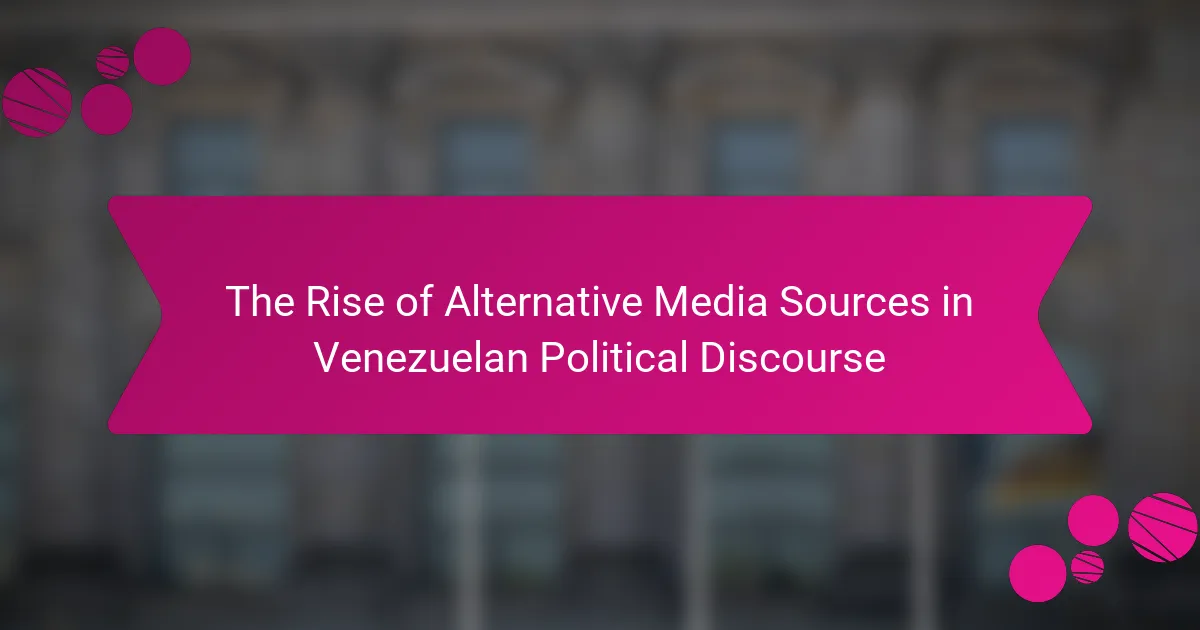
What are Alternative Media Sources in Venezuelan Political Discourse?
Alternative media sources in Venezuelan political discourse refer to non-traditional platforms that provide news and information. These sources often operate outside state-controlled media. They include independent online news outlets, social media channels, and citizen journalism. Alternative media emerged due to restrictions on freedom of expression in Venezuela. They serve as vital tools for disseminating information and fostering public debate. Examples include websites like El Pitazo and social media accounts that share uncensored news. These platforms often highlight issues neglected by mainstream media. Their role is crucial in shaping political narratives and mobilizing public opinion in Venezuela.
How have alternative media sources emerged in Venezuela?
Alternative media sources have emerged in Venezuela primarily due to government censorship and repression of traditional media. The Venezuelan government has imposed strict controls on media outlets, limiting their ability to report freely. This environment has forced journalists and citizens to seek alternative platforms for sharing information. Social media has played a crucial role in this shift, allowing for real-time news dissemination. Platforms like Twitter and Facebook have become vital for reporting events and mobilizing protests. Additionally, independent news websites have been established to provide uncensored information. According to a report by the Committee to Protect Journalists, many journalists have turned to these alternative channels to escape persecution. This shift reflects a growing demand for diverse perspectives in the Venezuelan political landscape.
What historical factors contributed to the rise of alternative media in Venezuela?
The rise of alternative media in Venezuela is primarily attributed to government censorship and economic crisis. Over the years, the Venezuelan government has imposed strict regulations on traditional media. This repression led to a decline in independent journalism. As a result, citizens sought alternative platforms for news and information. The economic crisis further exacerbated the situation. Many traditional media outlets faced financial difficulties and shutdowns. In response, grassroots initiatives emerged to fill the information void. Digital platforms became popular for sharing news and opinions. These factors collectively fostered the growth of alternative media in Venezuela.
How do alternative media sources differ from traditional media in Venezuela?
Alternative media sources in Venezuela differ from traditional media primarily in their independence and focus on grassroots reporting. Traditional media is often state-controlled or influenced, leading to biased narratives. In contrast, alternative media platforms provide diverse viewpoints and often cover issues overlooked by mainstream outlets. They utilize social media and digital platforms to reach wider audiences. This allows for real-time updates and community engagement. A notable example is the rise of independent news websites and social media accounts that report on protests and government actions. These sources often face censorship but continue to thrive due to public demand for uncensored information.
Why are alternative media sources significant in Venezuelan political discourse?
Alternative media sources are significant in Venezuelan political discourse because they provide diverse perspectives often absent from mainstream outlets. These sources challenge government narratives and promote transparency. In a country where state-controlled media dominates, alternative platforms enable citizen journalism. They facilitate grassroots movements and amplify marginalized voices. Reports indicate that during political crises, alternative media has played a crucial role in disseminating real-time information. For instance, during the 2017 protests, social media and independent news outlets were vital in mobilizing citizens. Overall, alternative media fosters democratic engagement and critical dialogue in Venezuela’s political landscape.
What role do alternative media play in shaping public opinion in Venezuela?
Alternative media significantly shape public opinion in Venezuela by providing diverse perspectives. These platforms often circumvent state-controlled narratives. They offer critical analysis of government actions and policies. Alternative media highlight social issues often ignored by mainstream outlets. They empower citizens by facilitating grassroots reporting. This fosters a more informed public discourse. Research indicates that alternative media have increased political engagement among Venezuelans. For example, studies show a rise in online news consumption correlating with protests and civic actions.
How do alternative media sources contribute to political mobilization and activism?
Alternative media sources enhance political mobilization and activism by providing platforms for diverse voices. They offer critical information that mainstream media often overlook. This information empowers citizens to engage in political discourse. Alternative media also fosters community organizing by connecting like-minded individuals. It allows for real-time updates on political events and grassroots movements. Studies show that social media platforms, a form of alternative media, significantly increase political engagement. For instance, during the Venezuelan protests, platforms like Twitter and Facebook were vital for mobilizing supporters. This engagement leads to increased awareness and participation in political actions.

What challenges do alternative media sources face in Venezuela?
Alternative media sources in Venezuela face significant challenges such as government censorship and repression. The Venezuelan government has a history of targeting independent media outlets. This includes the use of legal actions, intimidation, and physical threats against journalists. For example, the National Telecommunication Commission has revoked licenses of several media outlets. Additionally, many alternative media sources struggle with limited access to funding and resources. This financial strain hampers their ability to operate effectively. The hostile environment also leads to self-censorship among journalists. They often avoid sensitive topics to protect themselves and their outlets. Lastly, the lack of internet access in certain areas further complicates the dissemination of information. This creates barriers for reaching broader audiences.
How do government regulations impact alternative media in Venezuela?
Government regulations severely restrict alternative media in Venezuela. The government employs censorship tactics to control information flow. Laws and regulations limit the ability of alternative media to operate freely. Journalists face harassment and intimidation for reporting dissenting views. The government often blocks websites and social media platforms. This suppression leads to a decrease in the diversity of viewpoints available to the public. According to reports from organizations like Human Rights Watch, over 100 media outlets have been closed in recent years. Additionally, the government uses legal threats to discourage independent journalism.
What are the consequences of censorship for alternative media outlets?
Censorship significantly impacts alternative media outlets by limiting their ability to disseminate information. It restricts access to diverse viewpoints and stifles public discourse. This can result in a lack of transparency regarding governmental actions. Alternative media often serves as a counterbalance to mainstream narratives. When censored, these outlets may struggle to survive financially due to reduced audience engagement. Historical examples show that censorship leads to increased reliance on underground or covert communication methods. This can further fragment the media landscape, making it harder for citizens to access reliable information. Ultimately, censorship undermines the role of alternative media in promoting democratic engagement and accountability.
How do alternative media sources navigate financial constraints?
Alternative media sources navigate financial constraints by utilizing diverse funding strategies. They often rely on crowdfunding to gather support from their audience. Additionally, some alternative media outlets seek grants from non-profit organizations that support independent journalism. They may also engage in partnerships with other media entities to share resources and reduce costs. Sponsorship and advertising from ethical brands can provide supplementary income. Furthermore, many alternative media sources prioritize low-cost digital platforms to minimize operational expenses. This approach allows them to maintain independence while delivering critical content. According to a 2021 study by the International Journal of Communication, alternative media outlets that diversify their funding sources are more resilient in financially challenging environments.
What risks do journalists face when working with alternative media in Venezuela?
Journalists working with alternative media in Venezuela face significant risks, including censorship, harassment, and physical violence. The government often targets these journalists to suppress dissenting voices. According to the Committee to Protect Journalists, many reporters have been detained or faced threats for their work. Additionally, alternative media outlets frequently operate without the same legal protections as traditional media. This makes them vulnerable to arbitrary closures and legal actions. The hostile environment creates a climate of fear, leading to self-censorship among journalists. Reports indicate that several journalists have fled the country to escape persecution. The combination of these factors severely limits press freedom in Venezuela.
What are the safety concerns for journalists in the current political climate?
Journalists face significant safety concerns in the current political climate. Increasing violence against media professionals is a critical issue. Reports indicate a rise in threats, harassment, and physical attacks. Journalists often encounter censorship and legal repercussions for their reporting. The political environment can lead to arbitrary detentions of journalists. Access to information is frequently restricted, hindering their ability to report accurately. Additionally, state-sponsored disinformation campaigns target media outlets. According to the Committee to Protect Journalists, Venezuela is one of the most dangerous countries for journalists. These factors create a hostile environment that threatens their safety and freedom.
How do threats and violence against journalists affect media reporting?
Threats and violence against journalists significantly undermine media reporting. Such intimidation leads to self-censorship among journalists. They may avoid sensitive topics to protect themselves. This results in a lack of comprehensive coverage on critical issues. According to the Committee to Protect Journalists, over 1,300 journalists have been killed since 1992, creating a climate of fear. In Venezuela, journalists face harassment and violence, which limits their ability to report freely. Consequently, the public receives incomplete information, impacting democratic discourse. This suppression of journalism can also lead to increased reliance on alternative media sources.

What are the future prospects for alternative media sources in Venezuelan political discourse?
Alternative media sources in Venezuelan political discourse are likely to grow in influence and reach. The increasing use of social media platforms allows diverse voices to emerge. These platforms facilitate real-time communication and information sharing. The Venezuelan government’s restrictions on traditional media create a demand for alternative sources. Many citizens seek independent news to understand political developments. Research indicates that alternative media can mobilize public opinion effectively. As a result, these sources may play a crucial role in shaping future political narratives. The adaptability of alternative media to local contexts enhances their relevance and sustainability.
How might the landscape of alternative media evolve in Venezuela?
The landscape of alternative media in Venezuela may evolve through increased digital access and innovative platforms. As internet [censured] rises, more citizens will engage with online content. Mobile technology will play a crucial role in this shift. The use of social media will enable grassroots movements to gain visibility. Independent journalism will likely flourish, providing diverse perspectives. Government censorship may drive alternative media to adopt more secure communication methods. Collaborations with international organizations could enhance content credibility. The demand for transparency will push alternative media to prioritize investigative reporting. Overall, these factors could significantly reshape the media environment in Venezuela.
What technological advancements could influence alternative media in the future?
Artificial intelligence and machine learning will significantly influence alternative media in the future. These technologies enable personalized content delivery and enhance audience engagement. Blockchain technology can offer transparency and security in content distribution. This ensures that information is verified and authentic. Additionally, advancements in mobile technology will increase accessibility to alternative media platforms. More users will be able to access diverse viewpoints anytime, anywhere. Social media algorithms will evolve to prioritize alternative media sources, amplifying their reach. Virtual and augmented reality can provide immersive storytelling experiences. These advancements will reshape how audiences interact with alternative media.
How can alternative media sources strengthen their impact on political discourse?
Alternative media sources can strengthen their impact on political discourse by providing diverse viewpoints and fostering community engagement. They often present information that mainstream media overlook, thus enriching public debate. By utilizing social media platforms, alternative media can reach wider audiences quickly. Engaging with local communities allows these sources to address specific concerns relevant to their audience. Collaboration with grassroots organizations can amplify messages and mobilize support for social issues. Empirical studies show that alternative media can increase political participation among underrepresented groups. For instance, research indicates that alternative outlets in Venezuela have contributed to heightened awareness of political issues among citizens. This engagement ultimately leads to more informed and active citizenry.
What best practices can alternative media outlets adopt for sustainability?
Alternative media outlets can adopt several best practices for sustainability. They should diversify revenue streams to reduce dependency on a single source. This can include subscriptions, crowdfunding, and partnerships with non-profits. Building a strong community around the outlet enhances engagement and loyalty. Engaging with audiences through social media fosters interaction and feedback. Collaborating with other media outlets can amplify reach and share resources. Prioritizing quality content over quantity helps maintain credibility and trust. Implementing transparent practices can build audience confidence in the outlet. Lastly, investing in training for staff ensures high standards and adaptability to changing media landscapes.
How can alternative media sources build trust and credibility with their audience?
Alternative media sources can build trust and credibility with their audience by prioritizing transparency and accuracy. They should clearly disclose their funding sources and affiliations. This practice helps audiences understand potential biases. Providing verifiable information and citing credible sources enhances reliability. Engaging with the audience through feedback and open dialogue fosters trust. Regularly updating content to reflect new information demonstrates commitment to accuracy. Moreover, showcasing diverse viewpoints can build a reputation for fairness. Research indicates that transparency in reporting increases audience trust levels significantly.
What strategies can enhance the reach and engagement of alternative media platforms?
Utilizing social media effectively can enhance the reach and engagement of alternative media platforms. Platforms like Twitter and Facebook allow for real-time interaction with audiences. Regularly posting engaging content increases visibility. Collaborating with influencers can tap into their follower base. Hosting live discussions or Q&A sessions fosters direct engagement. Utilizing multimedia formats, such as videos and podcasts, attracts diverse audiences. Analyzing audience feedback helps tailor content to their interests. Consistency in posting schedules builds audience expectation and loyalty. These strategies have been proven to increase audience engagement significantly across various platforms.
The main entity of the article is alternative media sources in Venezuelan political discourse. The article examines the emergence and significance of these non-traditional platforms, which have developed in response to government censorship and repression of traditional media. It highlights how alternative media provide diverse perspectives, facilitate grassroots reporting, and play a crucial role in shaping public opinion and political mobilization. Additionally, the article discusses the challenges faced by alternative media, including government regulations, financial constraints, and safety concerns for journalists, while also exploring future prospects and best practices for sustainability and engagement.
